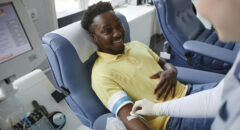 Did you know that Black men are twice as likely to die from prostate cancer than any other ethnic group? Did you also know that prostate cancer is 100% treatable? In the latest Operation Life: Back 2 Basics, Dr. Mack Roach breaks down and demystifies the prostate and prostate cancer. Specifically, he offers up new, timely solutions that men can employ to lower the discomfort of a biopsy and maintain healthy sexual functioning. He also advises of preventative measures men can take before a diagnosis. Finally, he advises the numbers men should know and what they mean about prostate health. Overall, Dr. Roach didn’t just provide information on prostate cancer. He provided hope.
Did you know that Black men are twice as likely to die from prostate cancer than any other ethnic group? Did you also know that prostate cancer is 100% treatable? In the latest Operation Life: Back 2 Basics, Dr. Mack Roach breaks down and demystifies the prostate and prostate cancer. Specifically, he offers up new, timely solutions that men can employ to lower the discomfort of a biopsy and maintain healthy sexual functioning. He also advises of preventative measures men can take before a diagnosis. Finally, he advises the numbers men should know and what they mean about prostate health. Overall, Dr. Roach didn’t just provide information on prostate cancer. He provided hope.
Prostate cancer and Black men had become so serious that you had to whisper it when saying the words out loud out of fear of catching it or speaking it into existence for a loved one. Fear of the known and unknown had men paralyzed into doing the very thing that would seal their fate. Nothing. This program was the first step (of many) to get men to stop whispering about, and start winning the fight against prostate cancer.
Check out this video to learn what you or your family members need to know about overcoming prostate cancer.
Why does it take so long to recover erections after the very best surgery?
According to Johns Hopkins, several explanations have been proposed for this phenomenon of delayed recovery, including mechanically induced nerve stretching that may occur during prostate retraction, thermal damage to nerve tissue caused by electrocoagulation cautery during surgical dissection, injury to nerve tissue amid attempts to control surgical bleeding, and local inflammatory effects associated with surgical trauma.
Are there any surgical techniques that have been developed to improve erectile function outcomes?
At this time, there are several different surgical approaches to carry out the surgery, including retropubic (abdominal) or perineal approaches as well as laparoscopic procedures with freehand or robotic instrumentation.
Much debate but no consensus exists about the advantages and disadvantages of the different approaches. Further study is needed before obtaining meaningful determinations of the success with different new approaches.
The Cancer Centers of America shared four really good steps to help you recover back to a healthy sex life:
Step One: Communication.
Before real progress can be made, couples need to take the time to think about and remember why sex is special and what they miss about it. The intimacy of sex fosters a bond through passion, love and, most of all, acceptance.
Patients may feel insecure because of certain changes in their bodies, or they may worry that they no longer have or even deserve their partners’ acceptance. A great first step in healing their physical relationship is for these couples to discuss their mutual desire to be together. If they can regain intimacy and comfort in romantic moments, it makes the physical challenges far easier to approach as a team.
Step Two: Intimacy rehabilitation.
During this sensitive time, it may be helpful and less stressful to think of sexual relations as “just another body system.” In the field of physical therapy, you encourage restorative steps, push the limits and set realistic expectations. Sex and intimacy are no different, and it is important to rejoice in every victory, big or small. For intimacy therapy to be successful, you must schedule time and develop realistic goals. Little by little, you work toward getting back to the physical function you enjoyed before. Medications and devices may also help and are nothing to be upset or ashamed about.
Step Three: Making time.
Put time for intimate moments on your calendar, or develop a tradition of kindling intimacy on certain nights. Yes, you can also still enjoy as much spontaneous intimacy as you like, but set a minimum of at least twice a week for intimate play, but not necessarily sex. If you have sex, that’s great, but that isn’t the point, so you haven’t failed if you don’t have sex.
The point is to rebuild intimacy into your partnership by using time and cooperation as your tools. Sex is a great way to achieve intimacy, but it isn’t the only one, and there are a lot of kinds of sex. Succeed at intimacy together and celebrate that victory. Rejoice in closeness and talk about it.
There is no stress because you can’t fail at intimacy. As you progress through rehabilitation, you may need healthcare professionals who support you. Consider turning to doctors who can talk with you openly about the subject, without making you feel uncomfortable.
Step Four: Personalize your plan.
Many options are available for you to discuss with your physician, including little blue pills, vaginal dilators, pumps, injections and all kinds of creams.
It might sound like these options would suck the intimacy right out of a sexual encounter, but not if you and your partner set a foundation of strong and frequent intimacy. Building that foundation will make medical interventions around sexual function an experience you both share.
The couples who rehabilitate intimacy together are the couples with a good shot at having great sex. Perhaps even more importantly, they’re also the ones who more often describe the results as truly great sex.









